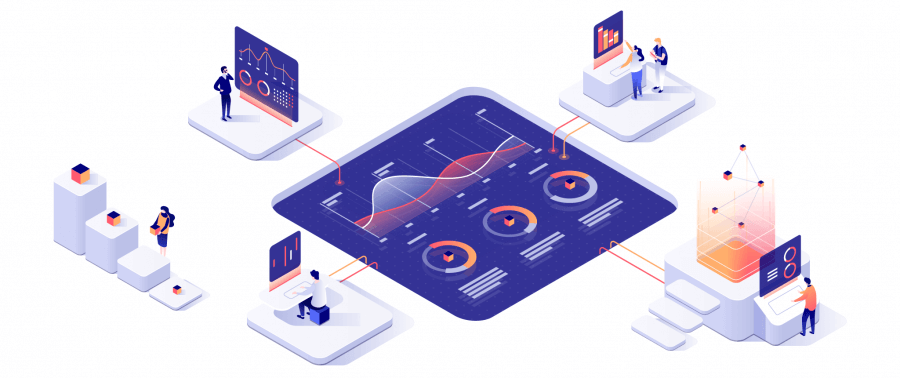These days, marketing is far from the Mad Men-esque scotch-fueled bonanza. The Internet has made most niches and markets global, with the appropriate levels of competition. Plus, the target audience for most B2C companies has increased immensely in the past 20 years. The world of online commerce gives us access to far more buyer information than retail ever could — and contemporary marketing strategies are making use of that.
Database marketing has become a mainstream practice for all kinds of marketing campaigns and we’ll go into the details of how and why below!
Database Marketing 101
Before going into all of the details of database marketing, we’ll take a look at what this means in the first place. For the average layman, this type of marketing may seem like a bunch of unconventional formulas that are supposed to lead to higher conversion rates.
In reality, database marketing has become pretty much the norm for all companies focused on online marketing. Today, knowledge is power, and in the case of marketing, it’s knowledge about your customers.
Database marketing, much like the name suggests, depends on companies gathering vast amounts of information and data on their customers and then creating usable databases that can direct their marketing efforts.
This means having detailed information on all of the interactions between your company and your consumers — from histories of transactions to emails.
It goes beyond that, however — companies use digital technologies like Internet cookies to learn all about the purchasing and browsing habits of their customers. That information can then be utilized to fine-tune a marketing campaign to convert the most leads in any given target audience.
Targeted Interactions
Even in a specified target audience, not all customers are a homogenous group with the same feelings and preferences. When companies like azcitationservices.com try to improve brand value for their clients, they don’t use the same advertising strategy for all consumers.
That’s the beauty of database marketing — the ability to make a slew of different campaigns and interactions for each different part of your target audience. Customer segmentation is an important strategy for achieving the biggest possible volume of conversion.
But how does this look in practice? There are plenty of “rules” by which we can differentiate members of a general target audience. For instance, while there are products that people of all ages may want to purchase, different age groups react positively to disparate advertising.
In the age of the Internet, you can easily categorize your leads by a host of factors (age included) and send out more precisely targeted email blasts; or display different banners on websites that cater to different groups.
Higher Efficiency
The benefits of targeted database marketing are quite obvious — not only do you reach the most people with your message, but your marketing campaign is also far more cost-beneficial.
There are few wasted resources in e-marketing if your message is superbly targeted because fewer leads will fall out of the sales funnel without making a purchase. Comparatively, a catch-all marketing strategy is likely to seem far more generic, and thus connect with no one at all.
Strategies for Database Marketing
The specifics of your database marketing strategy will depend upon the defining traits of your brand, but there are still some considerations that everyone needs to keep in mind, especially where service marketing is concerned.
When you employ a database marketing strategy, your audience targeting can be more precise than it ever was, with far more data to base your conclusions on.
However, there’s another side of that coin: with online marketing being specific for each customer category, audience targeting becomes more important than ever before. Any missteps in defining what your target audience wants to hear and see will result in a bigger misfire than with a more generic advertising plan.
Your customer profiling needs to include every aspect of the consumer’s life, both personal and professional. Where they live is as important as how old they are and what they do — in essence, every piece of information is crucial here.
Software Requirements
When you’re more reliant on data, you’re more reliant on technology as well, which means that your strategy will require more than copywriters and marketing managers.
You will need to choose the right software for database management and then utilize it properly to build customer databases that are useful in the long term.
Data Gathering
In database marketing, everything boils down to hard data. That’s why you need to be careful with data management if you want to successfully promote your business via database marketing strategies.
Your software environment and your customer database is an investment, make no mistake about that. Building brand-specific databases take a huge amount of effort and skill. For that reason, you need to be on the safe side when it comes to glitches and technical issues.
A good database marketing software makes regular backups of all of your information automatically so that you don’t have to worry about power lapses or other glitches.
Privacy Concerns
Database marketing rests on one simple premise — consumer information is readily available online. And that much is definitely true, seeing as people divulge all kinds of personal data while they use online applications.
And we’re not just talking about things like GPS data that we share with map applications. Social media profiles that most of us have reveal everything about our interests, preferences, opinions, thoughts, feelings — everything that informs how and why we purchase things.
That’s why database marketing efforts can be incredibly detailed. At the same time, such strategies need to show an appreciation for the personal privacy of consumers.
Everyone likes seeing marketing for things they’re interested in, but no one wants the feeling that companies know a lot about their private lives. Make sure that personalization is effective, but not aggressive.




